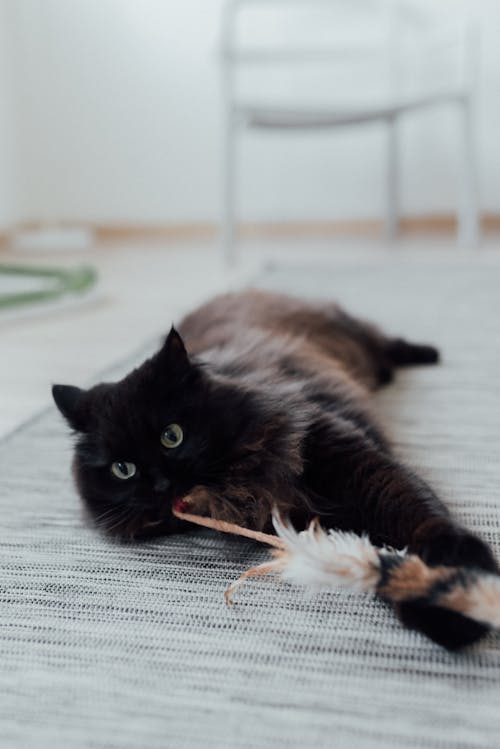In the animal world, at least the one we relate with, a cat is standoffish, fickle, and picky with its affection. Their will can’t be bent, and they’re quick to dish out instant retribution with razor-sharp teeth and claws. That’s not exactly baby-friendly, is it? As such you’re wondering is it safe to have cats around newborns?
Avoid leaving your newborn alone in a room with your cat. Whether it’s jealous and aggressive, or just a docile but curious kitty, you’re still dealing with an unpredictable animal. Cats are comfort and heat seekers, and they can curl up on your infant, interfering with breathing.
Have you been researching online only to see that cats are evil gateways to hell, and they can suck the life out of your newborn? That’s an old wives’ tale. But it’s best not to leave your baby and kitty together unattended, seeing as it can result in infection or injury. Read on to learn how to make the arrival and co-habitation with your tot less stressful for your feline.
Are the Myths Surrounding Cats and Newborns Debunk-Able?
All cats have their personality traits, much like us. It’s said that when baby Jesus lay in a manger, crying his heart out, a tabby cat hopped in there and consoled him with purring and warmth. His mother was grateful, and legend goes she drew her initials M for Mary on the feline’s forehead, explaining why that breed sports the sign.

In Egyptian mythology, Bastiat has a head resembling a domestic cat. In turn, felines were treated with utmost adoration, especially by mothers. The deity was designated protector of pregnant women and babies. Freya was the Norse goddess for hearth and home, wife of Odin who got around on a chariot driven by cats.
While myth is far from reality, these legends show how closely intertwined human history is with domestic cats. Other myths and half-truths, however, don’t paint your housecat in a positive light. These include that a cat can spray your baby, aiming to establish territorial scent marking. Another is the exaggerated risk of toxoplasmosis, a parasitical disease for which felines are carriers.
The disease is indeed a risk for fetuses, and you were more at risk when pregnant than your newborn is. Cats carry the parasite that causes toxoplasmosis from eating rodents or infected birds. But you’re more likely to get infected from handling raw meat than from your cat’s feces.
What Safety Concerns Should I Have Having My Cat around My Newborn?
According to an article debunking common myths, 2000 saw the only recorded case of baby suffocation that was probably caused by a cat. Six-week-old Keiron Payne was found dead by his mum with the family kitty laying close by. A pathologist determined that he died from SIDS or sudden infant death syndrome, and the feline’s proximity was a coincidence.
Having a pet within the house in the presence of a newborn baby comes with responsibilities, even if it’s a harmless-looking goldfish. By being around your child, your cat poses a risk that you can circumnavigate if you’re aware of what to look for.
Can Newborn Smothering and Suffocation Happen by Cat?
If especially your kitty climbs into the baby’s crib, there’s a risk it could cause smothering and suffocation. The best quick fix for that is to ensure that your cat stays away from your newborn, especially when they’re sleeping.
Whether it’s in the bassinet, crib, infant seat, swing, or your bed, its means that;
- You’ll supervise your baby when they’re sleeping outside of their bassinet or crib
- Place a cat-proofing net over the crib or baby’s bassinet
- Keep the door closed and cat-proof open windows to a room your newborn is sleeping in
- Maintain vigilance where your baby is sleeping in case the cat gets in without your knowledge
Is the Risk of Toxoplasmosis Infection That Serious?
Being a cat owner, this is a risk that probably was on your mind throughout the pregnancy. As such, you probably did everything you could to prevent the toxoplasmosis protozoa from infecting your unborn baby. While rare, newborns are also susceptible to this disease, causing flu-like symptoms like body aches, swollen glands, and fever.

To protect your newborn from the risk of toxoplasmosis your cat poses;
- Keep kitty indoors, away from rodents and stray cats
- Don’t allow cat litter to come into contact with your newborn
- Wear gloves or wash your hands after changing your cat’s litter box
- Avoid feeding your cat raw meat, which raises the risk of contracting toxoplasmosis parasites
What about Problems with Cat Hairs and Allergies?
When you live with an animal that sheds, it’s typical to end up with fur hairs everywhere. That includes getting into the mouth of your newborn, which, while gross, isn’t particularly harmful.
If your tot ingests copious amounts of cat fur, they’re likely to cause gastrointestinal blockage. Since your newborn cannot intentionally feed on feline fur, any on-the-blanket hair occasionally swallowed isn’t digestible and, therefore, harmless. That’s unless your child is allergic to cat hairs.

Cases of cat hair causing respiratory allergies aren’t common in households where an infant grows around shedding animals. Research has proven that infants who come in contact with pets at an early age face a lower risk of developing animal-related allergic reactions.
Scratches and Bites then, right?
Compared to dogs, cats are less likely to threaten a newborn physically with bare teeth and claws. But that’s not to say that cosmetic damage is impossible, whether delivered aggressively or playfully. If scratching is deep enough, septic infections and ringworm may get introduced into your child’s system.
The best approach is to supervise all contact between your newborn and the cat. With time, as your kitty gets used to the idea that this new ball of crying and wiggling isn’t leaving, tensions will settle down.
Conclusion
Cats have been known to react with jealousy when your attention is divided by someone else. It’s the reason for the word ‘catfight’ which describes a vengeful battle fueled by envy and spite. However, you can prepare your kitty early so that changes in their routine or your time with them won’t be so impactful.
Preventative measures you can take include introducing baby furniture way before your tot comes. Transferring territory your cat supposedly ‘lords’ over so that it’s not in conflict with your newborn also works. Handle feline stress behavior with patience and not a kick on their backside.
